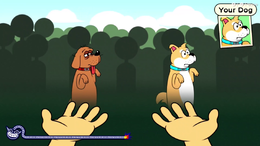Take My Hand: Difference between revisions
From the Super Mario Wiki, the Mario encyclopedia
Jump to navigationJump to search
m (→Gameplay) |
m (Text replacement - "(\| *)Jap([RMCN\d]* *=)" to "$1Jpn$2") |
||
| (2 intermediate revisions by 2 users not shown) | |||
| Line 20: | Line 20: | ||
==Names in other languages== | ==Names in other languages== | ||
{{foreign names | {{foreign names | ||
| | |Jpn=まいごさがし | ||
| | |JpnR=Maigo Sagashi | ||
| | |JpnM=Lost child search | ||
|ChiS=寻找走失者 | |ChiS=寻找走失者 | ||
|ChiSR=Xúnzhǎo zǒushī zhě | |ChiSR=Xúnzhǎo zǒushī zhě | ||
Latest revision as of 16:47, January 7, 2025
| Take My Hand | |
|---|---|

| |
| Appears in | WarioWare: Move It! |
| Type | Makin' Waves (Dribble & Spitz) |
| Command(s) | Take your child's hand! / Take your dog's paw! |
| Info | ""Now where has my kid gotten to?!" When your child reaches out their hand, be sure to grab on tight." |
| Controls | Any button on Any button on |
| Form(s) | Gift Giver |
| Glyph | Button Sign |
Take My Hand is one of Dribble & Spitz's microgames in WarioWare: Move It! This microgame shares its music with Locomotion.
Gameplay[edit]
The player must close their hand when their child/dog places their hand on one of the player's. If successful, the child, monkey, or dog laughs. If the player takes the wrong child/monkey/dog, the correct child, monkey, or dog either cries or looks annoyed (one of the children also looks annoyed if wrongly grabbed) and the player loses.
- Level 1: There are two children/dogs who reach out to the player once. The crowd in the background is green.
- Level 2: There are three children/dogs who reach out to the player before taking their hand back. The crowd in the background is red.
- Level 3: Same as Level 2, but there are three children and a monkey or four dogs, and some may fake-out a reach. The crowd in the background is indigo.
Names in other languages[edit]
| Language | Name | Meaning | Notes |
|---|---|---|---|
| Japanese | まいごさがし[?] Maigo Sagashi |
Lost child search | |
| Chinese (simplified) | 寻找走失者[?] Xúnzhǎo zǒushī zhě |
Looking for the lost | |
| Chinese (traditional) | 尋找走失者[?] Xúnzhǎo zǒushī zhě |
Looking for the lost | |
| Dutch | Helpende hand[?] | Helping hand | |
| French | Prends ma main[?] | Take my hand | |
| German | Helfende Hand[?] | Helping hand | |
| Italian | Prendi la mia mano[?] | Take my hand | |
| Korean | 미아 찾기[?] Mia Chajgi |
Finding lost child | |
| Spanish | Dame la mano[?] | Give me your hand |